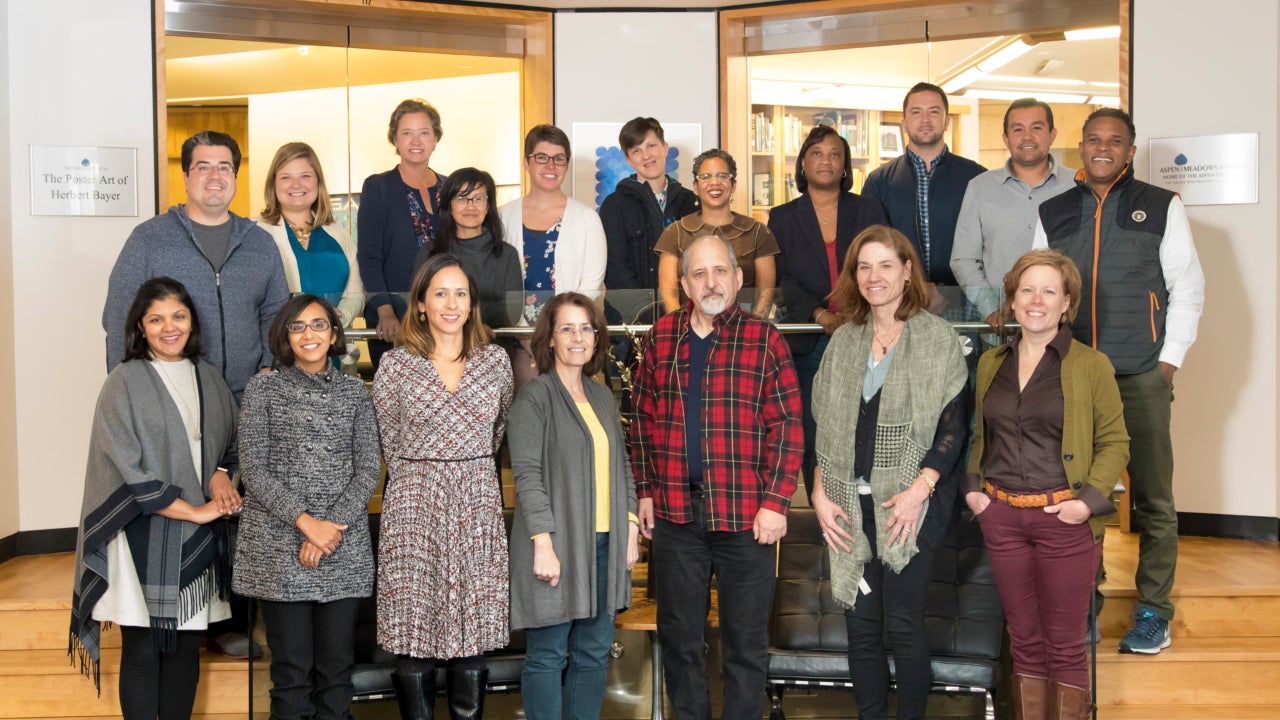Job Quality Fellow, Class of 2017-18
Co-Founder and Co-Executive Director, Coworker.org

When did you first start thinking about job quality, and how did that shape your decision to create Coworker.org?
I was raised by a single mother who worked as a freelancer. I didn’t realize it at the time, but the experience of watching my mother struggle with the precarity of freelance work would shape my worldview around jobs and employment. When clients were late on payments, we couldn’t make rent that month. When my mother had a health scare, the deductible on her bare-bones insurance plan nearly bankrupted us. Despite this, I understood the appeal of freelance work. My mother was able to control how she spent her time and had flexibility and independence.
My father, on the other hand, was a merchant seaman who belonged to the Masters, Mates & Pilots union. Because he was a union member, he earned a middle-class income, had excellent health insurance, and later enjoyed an early retirement. But even as a kid, I knew that jobs like my father’s were disappearing. Union membership in the private sector has dropped below 7 percent, while pensions have declined and wages have remained stagnant. The workplace is increasingly fissured and disaggregated. But the changing economy holds a lot of promise too. There is enormous potential right now to build a more resilient, expansive labor movement — one that is open to all working people in our hyper-connected world, including gig workers and freelancers like my mom. We built Coworker.org to be a laboratory for workers to access information and peer support, pool resources, and experiment with ways to build power together and improve the quality of their work.
Why is job quality important?
Every leader should be concerned with the question of job quality. According to the World Health Organization, most people will spend one-third of their adult life at work. What happens in our workplaces has a tremendous impact on our overall quality of life, including health and safety, educational advancement, civic participation, and more.
The global economy is shifting rapidly as companies manage complex systems of production and increasingly rely on automated intelligence systems to operate their businesses. As the global economy changes, the experience of work is changing too. More people are participating in work beyond the traditional, 9-to-5 model, including independent, contingent, short-term, and freelance work. Today, even full-time employees are distributed globally via franchises, subsidiaries, and often invisible supply chains. These trends demand new policy solutions and new models of worker power to advance job quality.
Describe Coworker.org’s work and how it is addressing job quality.
I co-founded Coworker.org to help workers navigate and improve the modern, decentralized economy. Coworker.org is a digital platform that connects workers to their peers to influence working conditions and raise standards across industries and professions. Workers use the platform to create campaigns and develop a network of fellow workers focused on changing specific policies in their companies or workplaces. Through campaigns, workers can gather media and public attention, link with helpful nonprofit groups, elicit action from their employers, and create change. While our site is open to anyone from any kind of workplace, we’ve grown fastest in historically low-wage sectors such as the retail, restaurant, and hospitality industries.
Coworker.org is helping to build a labor movement for the 21st century. Traditional collective bargaining was designed for an industrial economy with large, centralized workplaces. Today’s workplaces are different. We believe that new models of worker voice are stronger when powered and driven by data and technology. There is enormous potential in pairing data and technology with workers’ knowledge and experience in their own companies and workplaces. When workers come together as a digital community and start to discuss the challenges they are facing, they can surface problems that may not be so obvious to one individual worker.
In its four years, Coworker.org has been used by nearly half a million workers participating in hundreds of campaigns on issues ranging from restrictive sales goals, to dress codes, to sexual harassment, to wage theft. One campaign involved scheduling practices at a major multi-national food service company. This employer had previously gone on the record to discuss the strength of their company’s scheduling system. However, this did not match the experiences of workers on the ground. The company’s workers were able to crowdsource information from workers in the United States and Canada and document their challenges with the scheduling system. A report with the workers’ data was released and, the following day, the company responded and has since addressed a loophole in the scheduling software that was contributing to these issues. This example illustrates how data and technology surface problems that are often systemic, but can be difficult for a CEO or human resources department to diagnose.
More recently, employees at a major retailer led a Coworker.org effort to boost wages in their US stores. Through their effort on Coworker.org, they recruited co-workers across the country, generated national media coverage, and enlisted support from elected leaders and community groups. After several months, the employer announced they were boosting wages by 10 to 15 percent in stores across the country. The employees at that retailer have gone on to launch new Coworker.org efforts and are currently urging their employer to commit to raising the wage floor to $15 per hour at stores across the United States.
In the next few years, what are Coworker.org’s goals as they relate to improving job quality?
Over the next few years, we aim to grow the number of workers using our platform and increase the rate of change in workplaces throughout the United States, Canada, and other regions. We believe that, by 2020, it will be possible to have 10 to 15 percent of the workforce of every Fortune 500 company engaging in leadership and advocacy on our platform. This representation would create a power center for workers to identify problems and advocate for improvements across workplaces and industries. If we are successful, we believe it will lead to a true shift in the checks and balances that are currently present in our economy.
Growth of our user base alone is not enough — we must measure our success against the number of workplace improvements that are advanced through our platform and the number of employees impacted by those changes. Over the course of the Fellowship, my team will be piloting new tools and interventions to support worker advocacy and information-sharing. We’ll also be deepening our support for networks of employees inside their companies and industries.
Describe the experience and perspective you bring to the Job Quality Fellowship.
As co-CEO of Coworker.org, I lead a small team of technologists, organizers, policy and legal experts, designers, and digital strategists in translating our vision for worker voice into powerful experiences for our platform’s users. I wake up every day to solve the problem of power and agency in the modern workplace. I think I’m one of the few people in the United States who can credibly say that I hear directly from workers across dozens of major companies and industries, including bank tellers, restaurant servers, baristas, hospital nurses, and retail workers, on issues related to job quality every single week.
My perspective is also informed by the geographic diversity of our user base. The majority of Coworker.org users live outside of major metropolitan areas in the United States. They are working for rideshare platforms in suburban South Carolina, managing chain restaurants in rural Ohio, and bagging groceries in college towns. Solutions for these workers might not look the same as those employed by my urban colleagues in the Fellowship. I’m convinced that when all working people have agency over their jobs and work lives, we can together create a more equitable, sustainable, and healthy economy.
What do you hope to learn and achieve through the Job Quality Fellowship?
I come from a background in union organizing, so I’m fascinated by the systems that govern work and the challenges decision-makers face at each level of the economy — from regulators, policymakers, investors, board members, CEOs, and HR directors down to shift managers. I’m eager to sit alongside the Fellows and hear how they are thinking through job quality challenges and what power dynamics they are observing in their own work. I’m also very interested in hearing about the pressures that businesses face when it comes to job quality so that I can be more strategic and effective in helping workers advocate for themselves.
There is no silver bullet for improving job quality in the United States or elsewhere. What is needed, and what this Fellowship is designed to explore, are different solutions and practices to restore balance to our economy. I’m interested in learning about a variety of strategies for addressing job quality and how some of these practices might be championed or implemented by workers on our platform and beyond. The Fellowship will afford me the opportunity to tap the expertise and insight of business and labor movement leaders, investors, and others that shape our economy so that I can better serve our networks of workers.
Share now
Tweet “When all working people have agency over their jobs and work lives, we can together create a more equitable, sustainable, and healthy economy.” @jess_kutch
Tweet “As the global economy changes, the experience of work is changing too… These trends demand new policy solutions and new models of worker power to advance job quality.” @jess_kutch
Tweet “Because he was a union member, he earned a middle-class income, had excellent health insurance, and later enjoyed an early retirement. But even as a kid, I knew that jobs like my father’s were disappearing.” @jess_kutch
Keep in touch
Learn how EOP is helping low- and moderate-income Americans connect to and thrive in a changing economy. Sign up to receive news about the Job Quality Fellows and other announcements via email.
We are grateful to the Ford Foundation and The Prudential Foundation for their support of this work.
